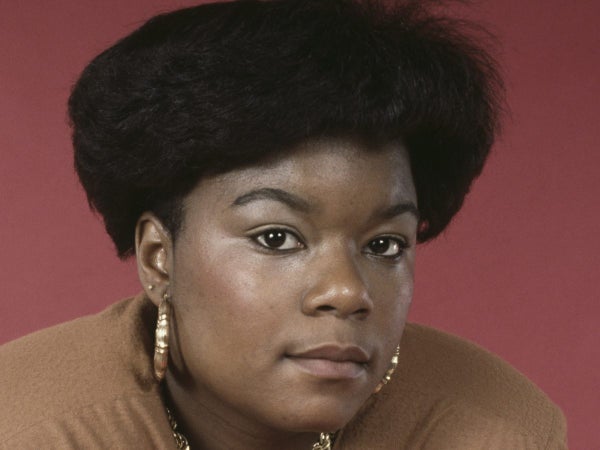 By Brooklyn White ·August 24, 2021August 24, 2021
By Brooklyn White ·August 24, 2021August 24, 2021
Kierna Mayo, a media maverick and an original staffer for groundbreaking hip-hop magazine The Source, has been one of the premier record-keepers of rap music. With an especial focus on the women of the genre (the debut 1999 issue of Mayo’s late magazine, Honey, featured Lauryn Hill on the cover), she has lovingly bridged the gap between lyricists and fans. Her essay “Hip-Hop Heroines” is a celebration of women’s contributions to hip-hop and is featured in the Smithsonian Anthology of Hip-Hop and Rap, which is available now.
“Hip-hop journalism and hip-hop feminism are both kind of coming to the world as I’m coming to the world,” Mayo says of the early days of her career. “That pivotal point where those two ideas that aren’t always the same thing, meet, collide and marry each other.”
The Smithsonian’s book nearly bursts with appreciation for a sound born out glory and anguish. Enlisting a crew of dedicated journalists, including Michael A. Gonzalez, Naima Cochrane and more, the 300-page book contains 11 essays, as well as rare images and a separate set of 9 mixtape-style CDs that encapsulate nearly 50-years worth of culture. The forefathers and foremothers are approached with the same amount of reverence with each careful page turn.
Mayo begins and ends her ode with a nod to the legacy of Roxanne Shanté, the teen who spat bars through braces and made a mark the moment she unsheathed the microphone. Like Shanté, Mayo is woven into the tapestry of hip-hop and is one of the ultimate reminders to remember the ladies. “To me she seemed like a real central, natural place to begin,” Mayo says. Reminiscing on the days of Jordache and Gloria Vanderbilt jeans and “thumping” parties, the writer takes us back to a time when women, girls rather, were first recognized as powerhouses within the burgeoning art form.
Keep reading for an excerpt of Kierna Mayo’s essay, “Hip-Hop Heroines.”
In January 2017, the biopic Roxanne Roxanne was crowned with the coveted Sundance Special Jury prize. Before its public debut, DJ Envy of New York’s Power 105.1 FM’s “Breakfast Club,” and asked the subject of the film, Lolita Shanté Gooden, if hip-hop culture had given her the credit she deserves. It was a fair question. Gooden, aka Roxanne Shanté, is a bona fide living legend, a true rap innovator, but at that point one largely forgotten to history. Her 1984 hit, the dis record “Roxanne’s Revenge,” was a surprise response to the UTFO Crew’s popular song “Roxanne Roxanne.” Thee squeaky-voiced MC was only 14 years old, but she had taken it straight to three guys with nothing but flow and bodacious swagger. They never saw it coming—and the culture didn’t either. Suddenly, there was a Roxanne obsession everywhere. She earned instant fame.
The storied battle rapper spoke graciously with the “Breakfast Club” hosts about the upcoming movie, and the tumultuous, if serendipitous, time in her teenage life that had inspired it. But one exchange was especially revealing: “Do you feel like … you were never appreciated like you should’ve been? … look at hip-hop, and they don’t mention you that much, as they should,” began Envy. Host Charlemagne the God chimed in, “I go back to Salt-N-Pepa, … when I think female rappers. He caught himself, “of course I’m very familiar, but when people talk about female rap, it don’t seem to go back no farther than Salt-N-Pepa.” Gooden pondered the question. Did she ever feel appreciated? “No,” she replied. “The reason why is because Roxanne Shanté has never looked or searched for accolades from others… I’ve always walked with a certain confidence. So I didn’t need anyone to validate me: I validate myself every morning. I didn’t need anyone to say, ‘Okay, … Roxanne Shanté started this.’ If you know that you started something, then there’s no need for anyone to tell you what you started. See, a lot of people need that validation, but I was blessed to already have that within myself.”
To understand that kind of relational dynamic between culture and self, and genuinely celebrate women in hip-hop, is a call to respect history. Beginnings matter, and there is indeed an order of things. Certainly, Gooden didn’t mean “started” as in Roxanne Shanté was the first female rapper ever. Rather, she understood that it was the circumstances of her life, and it was her skill, her Black girl teen bravado, and her dookie ropes and bamboo earrings that made and held space for Salt-N-Pepa. That’s what started meant.
Everyone has an origin story. Hip-hop’s foremothers of the mid-to-late ’70s—the earliest MCs and DJs—including The Mercedes Ladies, Sha-Rock, Lady B, and the Sequence—were just a handful of the young female artists at the center of hip-hop’s alpha phase, the ones at park jams, spitting rhymes, battling and even occasionally scratching records. In 1979, the same year that “Rapper’s Delight” arrived via the Sylvia Robinson-owned Sugar Hill Records, at least nine other female rappers released albums. Carried on the hips of their fly-girl party rhymes was the indomitable spirit of the working class. Alas, these early creators were citified Black and Brown girls, who for all intents and purposes, were the center of their own universe. They may have been invisible to the worlds outside their own, but filled with a brash spirit of self-confidence and self-worth not uncommon to girls from around the way, these young women and their contributions to the culture could never be erased.
Excerpt from Smithsonian Anthology of Hip-Hip and Rap, “Hip-Hop Heroines” by Kierna Mayo. Copyright © 2021. Purchase a copy here.
TOPICS: Hip-Hop
The post Ladies First: Smithsonian Hip-Hop Anthology Honors Women’s Contributions To The Genre appeared first on Essence.


0 Commentaires